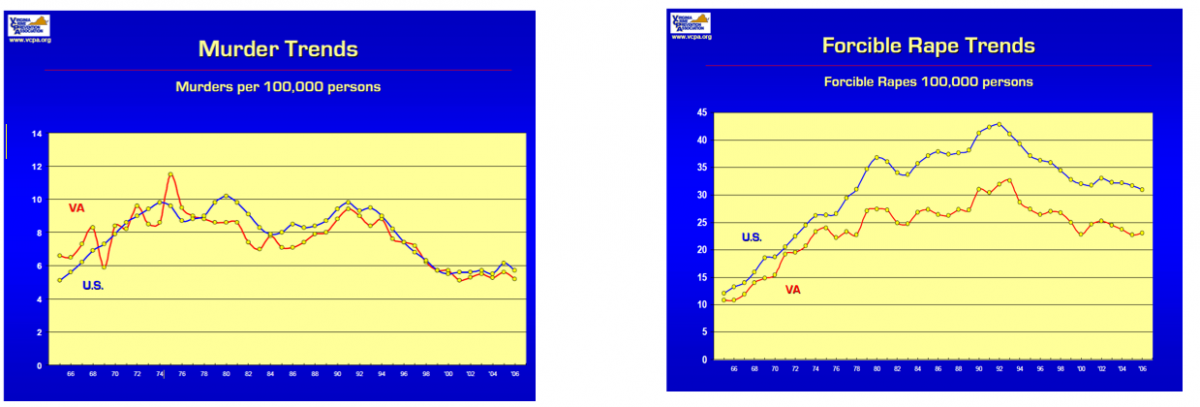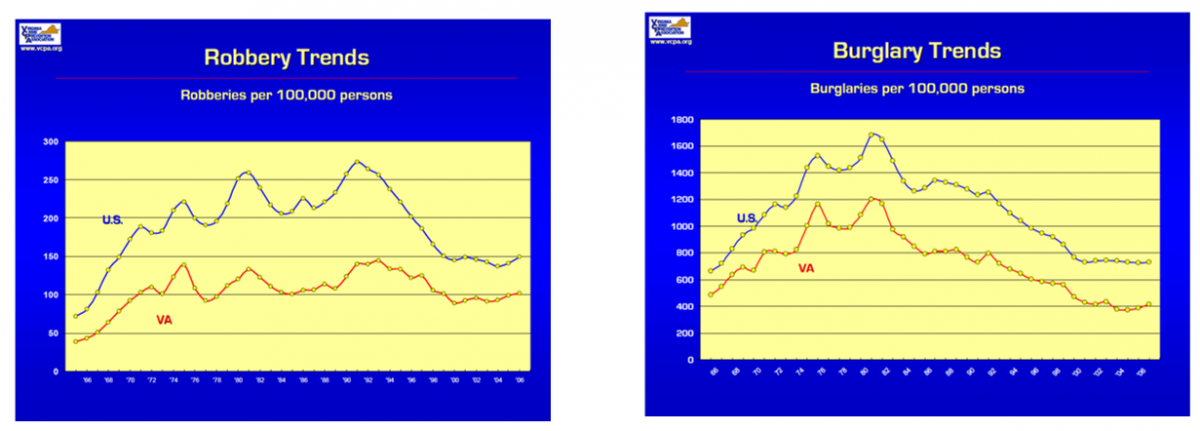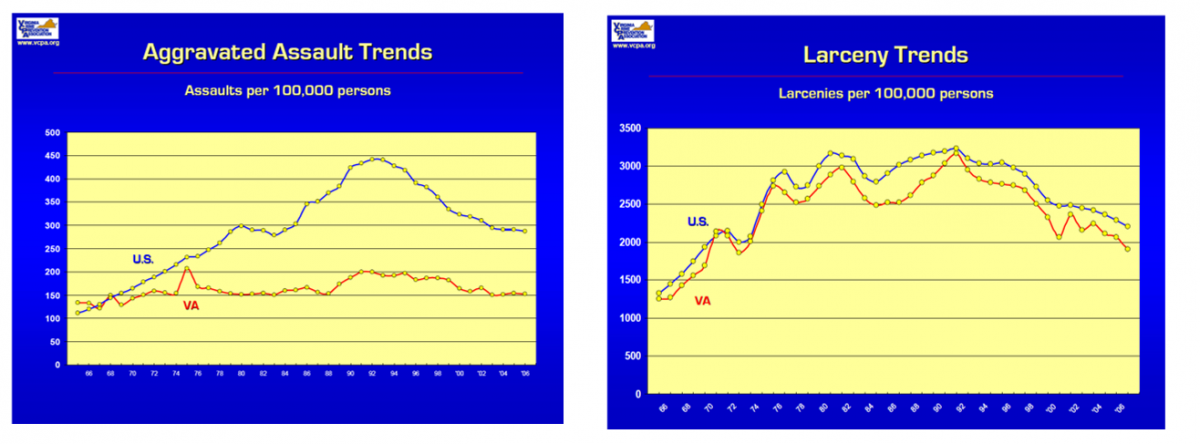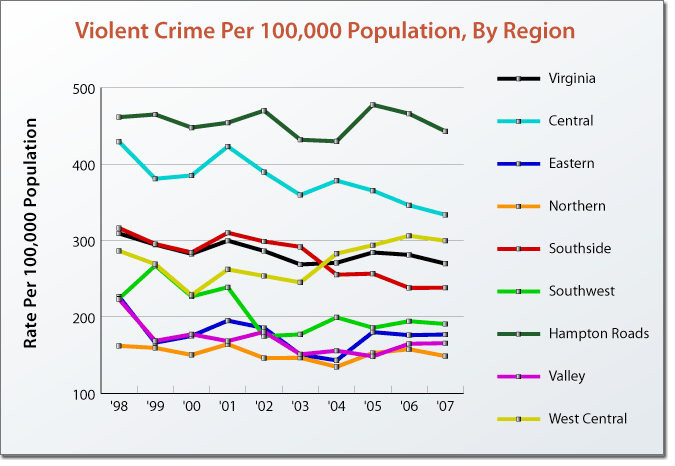The well being of a state in measured not only in terms of economic prosperity but also the physical security which the state can provide to its citizens. The incidence of crime is a very good indicator of the overall development of a state. The State of Virginia, like any other state in the US, has its share of crime. Incidences of crime are usually tabulated in the order of severity; as murder, forcible rape, robbery, aggravated assault, burglary, larceny and motor vehicle theft. This essay examines the nature of crime in the state of Virginia and attempts to outline the causative factors as also possible remedial measures to reduce the crime rate. The essay makes extensive use of data tabulated by the US Disaster Center (quoting FBI uniform Crime Report), and the Virginia Crime Prevention Association (VCPA) websites.

The statistical data of Virginia crime rates for the period 1965 to 2006 published by the Disaster Center provides an insight into the pattern of crime for the state. The murder rate of 8.2 per 100,000 people in 1965 (Disaster Center, 2008), shows a higher than national average till 1974 after which it drops below the national average but maintains closely thereafter as is depicted in the VCPA graph below. Interestingly, in the same period forcible rape shows a consistent increase starting at a figure of 12 in 1965, jumping to double digits, but below 20 from 1964 to 1970. Thereon forcible rape increases significantly to an average above 23 till 1989 wherein it rises yet again into the over 30 mark till 1993. The rates for forcible rape show a decline thereafter but yet are consistently high in the mid 20 figure. However these rates are considerably lower than the national average.
According to the Disaster Center report both murder and rape show a declining trend in Virginia in 2007. The statistics for robbery however show marked spikes over the period 1965-2006. There is a gradual double digit increase starting with 39.9 in 1965 till 1971 wherein it suddenly jumps to triple digits till 1976 with a two year gap in double digits, the rate again picks up to triple digit figure through the 1980s right up to the year 2000 where it drops to double digit figures. This relatively higher incidence of robbery over the period 1970 to 2000 corresponds to lower job opportunities in the state and thus allows for causative interpretation.

Burglary also shows a similar rise and fall which mirrors the trends for robbery. The statistics for aggravated assaults show a consistent triple digit figure ranging from 167 in 1965 to a high of 196.8 in 1992, thereafter tapering off to 152 in 2006. Larceny too follows a similar trend which is slightly lower than the national average. Compared to the overall National Statistics for crime rates, Virginia’s ranking is in the mid 40th highest crime rate. Thus, overall, the state has had a lower crime rate than most of the other states in the US.

Regional Crime Trends in Virginia
Within the state, the distribution of crime showed a distinctive pattern. For the period 2002 to 2006, violent crime viz. murder, forcible rape, robbery and aggravated assault was the lowest in the Northern region and the highest in Hampton Roads. The Department of Criminal Justice Service Virginia, states that the “overall violent crime rate decreased by 2.4% statewide over the same period” (p. 2). However, the West Central region showed the largest percentage increase in violent crime. Property crime rates viz. burglary, larceny and motor vehicle theft also showed the highest increase in Hampton Roads while the Eastern region had the lowest rate.
Northern region scored consistently at being the second lowest. In drug arrests, Hampton Roads yet again registered the highest number of incidences while the Northern region registered the lowest score. The startling percentage increase of 95.1 % in the West Central region points to an overall trend for that region. Thus in the state of Virginia, the safest region points to be the Northern region, Hampton Roads being the most dangerous area to live in and the West Central region slowly but surely catching up with Hampton Roads in registering an increase in criminality. The reasons for criminal behavior in Virginia are many and thus an analysis of the causative factors is required. The Virginia Government website (2008) very clearly brings out the comparison between its regions as is depicted in the graphic below

Causative Factors
Crime occurs because of breakdown of social cohesion in neighborhoods. Criminal behavior is also learnt through association with anti-social elements. Yet other assert that lack of economic opportunity results in the non-realization of the ‘American Dream’ which in turn forces people to a life of crime to compensate for the lack of opportunity. In short, crime had a socio-economic dimension. Others say that socio-economic disparities cause ‘general strain’ which leads to criminal behavior.
The control theory posits that lack of self or social control results in criminal behavior. Developmental theorists opine that crime has developmental causes that progresses from before birth right through a criminals’ life where the environment plays an important role in determining whether the individual can escape from a life of crime or not. Some others take an integrated approach wherein the basic postulates of some of the theories are put together to explain that criminal behavior occurs in a sequential manner. Nonetheless, it can be safely surmised that the main causative factor for crime in the State of Virginia could be attributable to social disorganization and lack of sufficient socio-economic opportunities.
Crum (2003) in his study of Virginia crime analysis has found that “Often, individuals, especially in West Virginia, are employed but have very low paying jobs, causing economic strain and hardship, which could possibly lead to increased crime and deviance” (p. 32). There is a direct correlation between poor economic conditions and crime rates as the Virginia State Police statistics suggest that “property crime rates rose the year after the 2001 recession and then fell in 2003” (King, 2009, para 7). The Northern region’s low crime rate is attributable to lower unemployment figures than Hampton Roads. Yet others point out that crime rates in Virginia are highest in areas of low population densities than in areas of high population densities.
Remedial Measures
In the fast paced world with its competing demands for time is taking its toll on the traditional family as a cohesive social unit. Increasing coercive measures against teenagers and young adults is usually counterproductive. Therefore, it is better to employ more humane methods of law enforcement than just plain policing. In case of the younger adults and teenagers, “early interventions to divert individuals from offending have been found to be one of the most effective types of intervention overall” (Rubin, Rabinovich, & Hallsworth, 2006, p. 11).
By early intervention, the community, the Police and the social workers identify the vulnerable individuals who are most likely to take up a life of crime. Having identified such individuals, the community then puts into place measures to prevent those individuals from falling wayside by providing them education, jobs and other avenues to utilize their energies.
The concept of ‘Restorative Justice’ in which the offender, the victim, their families, the community and the police, all are involved in the rehabilitative process is yet another method available. Improving the health of disadvantaged children and providing social and economic stability to such families would help in reduce crime. Therefore, community work and community building alongside policing is the best way ahead. Holistic protection of neighborhoods by providing better street lighting, installing surveillance cameras and maintaining regular routine patrols also helps bringing down crime.
In conclusion it can be said that the state of Virginia fares better than most American states in the rates of crimes committed. Graphical analysis shows that the general pattern of crime rate in Virginia is similar to the national average albeit on a lower scale. Amongst the regions in Virginia, Hampton Roads is the most crime ridden while the Northern region is the least. This difference in crime rates could be because better job opportunities are available in the Northern region than in Hampton Roads. The basic causative factors are socio-economic and the Government of Virginia fully understands the importance of progressing developmental activities and job creation to reduce the overall state crime rates.
Works Cited
Crum, B. (2003). Social Disorganization Theory and Crime in West Virginia. Web.
Department of Criminal Justice Services. (n.d.). Regional Crime Trends in Virginia, 2002-2006. Web.
Disaster Center. (2008). Virginia Crime Rates 1960-2007. Web.
Government of Virginia. (2009). Crime. Web.
King, L. (2009). Statistics Point to Increase in Crime During Recessions. Web.
Rubin, J., Rabinovich, L., & Hallsworth, M. a. (2006). Intervention to Redice Antisocial Behaviour and Crime. Web.
Virginia Crime Prevention Association. (n.d.). Crime Trends in Virginia 1965-2006. Web.